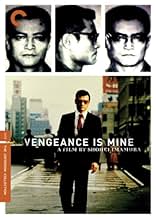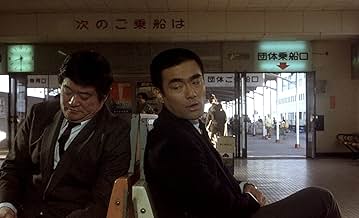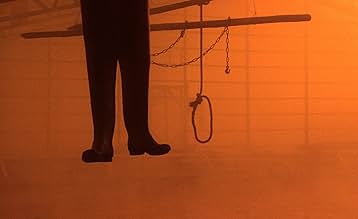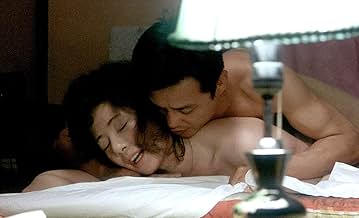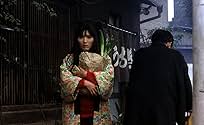IMDb-BEWERTUNG
7,7/10
7761
IHRE BEWERTUNG
Füge eine Handlung in deiner Sprache hinzuChronological exploits of Iwao Enokizu, a murderous thief on the run.Chronological exploits of Iwao Enokizu, a murderous thief on the run.Chronological exploits of Iwao Enokizu, a murderous thief on the run.
- Regie
- Drehbuch
- Hauptbesetzung
- Auszeichnungen
- 21 Gewinne & 6 Nominierungen insgesamt
Empfohlene Bewertungen
This dark masterpiece pushes to the limits of my toleration for violence and sex. We get to watch the "how", "when", "where" of the story of the murderous sociopath (brilliantly portrayed by Ken Ogata) but are denied any convincing "why" by Imamura. This film seemed to have echoes of Poe -- another master at combining humor with the horrific and macabre. When it comes to cinema, though, there is no other master anything like Imamura.
No aspect of this film (acting, cinematography, script) is less than impressive. A recent 2 DVD set from Panorama (a Hong Kong company) provides English subtitles and is technically adequate (albeit far from superlative).
No aspect of this film (acting, cinematography, script) is less than impressive. A recent 2 DVD set from Panorama (a Hong Kong company) provides English subtitles and is technically adequate (albeit far from superlative).
I think this movie is an all around tour-de-force depiction of a sociopath. All aspects of this movie are superb. The main actor gives a truly chilling and convincing portrayal of a man with no conscience, at the same time giving his character great depth and complexity. Aside from being based on true events, this cold blooded murderer is much more realistic than the clever game-playing types portrayed in such films as "Silence of the Lambs". I would highly recommend this movie to all but the squeamish.
Shohei Imamura's multi award winning film Vengeance is Mine follows after the dismal performance of The Profound Desire of the Gods, this time being a film that is more accessible. Based on a novel which follows the life of crime of real-life criminal Iwao Enokizu (played by Ken Ogata), at one time the most wanted man in Japan for his series of murders, this was probably my favourite movie today, until I watched Imamura's Palme d'Or winner Ballad of Narayama.
It's no surprise that this is something more conventional, given that it plays out narratively in retrospect, and that audiences sure like something that is based on real life. I thought it unfurled similarly to Catch Me If You Can, except that while Frank Abignale Jr was once a conman, defrauding banking institutions and adopting various identities, Iwao Enokizu was a killer first, and conman second, assuming identities to obtain cash for basic necessities, and for pleasurable moments to satisfy his lust for flesh.
The story seeks to discover his motivation and rationale for a life in crime, and goes way back to when Enokizu was a child, and hating his father for being weak in standing up against oppressors (in truth, there is little he can actually do except to lose his life if he doesn't comply). Hatred also bred deeper when his father is a religious hypocrite, obviously sinning against Enokizu with the lust for his wife Kazuko (Mitsuko Baisho, who's a dead ringer for Hong Kong actress Cherie Chung), and strangely enough, for Kazuko to fall heads over heals for the old man too. This father-son dynamics, like in Catch Me If You Can, pops up now and then through the story to remind you of the beginnings of the feud, except that there is absolutely no love between the two of them.
I thought Ken Ogata is enigmatic on screen, with his crazed antics as the killer on the loose, and his suave demeanour when posing as a professor and a lawyer. There's this mean streak within that glint in the eye, and surely, this is one man you definitely would not want to cross. For the most parts of the story, it deals with the love between his Enokizu and an inn manager Haru (Mayumi Ogawa), who falls in love with devotion of blind faith, and the happenings within the confines of that inn. What I thought was a bit difficult to sit through though, was the violence against women in the movie, with the constant slapping across the cheek (and I notice this too in the other Imamura films), and some included rape.
But the theme that took the cake was the one on religious hypocrisy as personified by Enokizu's father Shizuo (Rentaro Mikuni), and really, this is the kind of dads, or persons that you'll love to hate. Preaching something and practicing another, you wonder whether Enokizu would seek him out for revenge, since it seemed like Shizuo was indeed Iwao's most hated person on earth, rather than work on his victims by chance.
Vengeance of Mine is full of nudity, sex and gratuitous violence, which gave it an R21 rating for today's uncut screening. Simple to follow, and definitely enjoyable by fans who have a preference for true life crime stories. Some of the actors here become familiar faces when they get casted again in the next movie, Ballad of Narayama, and I thought Vengeance was a nice way of introducing those actors to us first.
It's no surprise that this is something more conventional, given that it plays out narratively in retrospect, and that audiences sure like something that is based on real life. I thought it unfurled similarly to Catch Me If You Can, except that while Frank Abignale Jr was once a conman, defrauding banking institutions and adopting various identities, Iwao Enokizu was a killer first, and conman second, assuming identities to obtain cash for basic necessities, and for pleasurable moments to satisfy his lust for flesh.
The story seeks to discover his motivation and rationale for a life in crime, and goes way back to when Enokizu was a child, and hating his father for being weak in standing up against oppressors (in truth, there is little he can actually do except to lose his life if he doesn't comply). Hatred also bred deeper when his father is a religious hypocrite, obviously sinning against Enokizu with the lust for his wife Kazuko (Mitsuko Baisho, who's a dead ringer for Hong Kong actress Cherie Chung), and strangely enough, for Kazuko to fall heads over heals for the old man too. This father-son dynamics, like in Catch Me If You Can, pops up now and then through the story to remind you of the beginnings of the feud, except that there is absolutely no love between the two of them.
I thought Ken Ogata is enigmatic on screen, with his crazed antics as the killer on the loose, and his suave demeanour when posing as a professor and a lawyer. There's this mean streak within that glint in the eye, and surely, this is one man you definitely would not want to cross. For the most parts of the story, it deals with the love between his Enokizu and an inn manager Haru (Mayumi Ogawa), who falls in love with devotion of blind faith, and the happenings within the confines of that inn. What I thought was a bit difficult to sit through though, was the violence against women in the movie, with the constant slapping across the cheek (and I notice this too in the other Imamura films), and some included rape.
But the theme that took the cake was the one on religious hypocrisy as personified by Enokizu's father Shizuo (Rentaro Mikuni), and really, this is the kind of dads, or persons that you'll love to hate. Preaching something and practicing another, you wonder whether Enokizu would seek him out for revenge, since it seemed like Shizuo was indeed Iwao's most hated person on earth, rather than work on his victims by chance.
Vengeance of Mine is full of nudity, sex and gratuitous violence, which gave it an R21 rating for today's uncut screening. Simple to follow, and definitely enjoyable by fans who have a preference for true life crime stories. Some of the actors here become familiar faces when they get casted again in the next movie, Ballad of Narayama, and I thought Vengeance was a nice way of introducing those actors to us first.
In late 1963 a serial killer and conman Akira Nishiguchi gained nationwide attention in Japan by murdering five people, several of them while on the run from the police. In the late 1970s a book based on his life inspired the master director Shôhei Imamura to use his story as the basis for a cold crime film titled Vengeance Is Mine. The film starts with the capture of the killer Iwao Enokizu (Ken Ogata) and advances non-chronologically, depicting the detectives interviewing his family and former lovers and how Enokizu first came to know them. Particularly the muted relationship of Iwao's wife Kazuko (Mitsuko Baisho) and his Catholic father Shizuo (Rentarô Mikuni) is paid attention to, so is his stay at a brothel-like inn managed by Haru Asano (Mayumi Ogawa) and her ex-con mother Hisano (Nijiko Kiyokawa). The scenes ranging from Enokizu's childhood to his time in death row cast light on what kind of man he is, but avoid serving easy, clear-cut explanations of his inner motives.
Imamura has taken an unspectacular, down-to-earth approach to his enigmatic subject. Some techniques, such as identifying the victims' names and causes of death by subtitles, are not far from the style of documentaries. While some of Enokizu's killings take place off-screen, the depicted murder scenes are not softened by turning the camera away or fading to black, making especially the sexual violence hard to watch for sensitive viewers. Still, Vengeance Is Mine is more of a character study than a crime thriller, as in the latter parts of the film the detectives' role is diminished and the focus turned to Enokizu. He is portrayed as having been belligerent and self-confident from young age, soon blossoming into a full-blown psychopath to whom other people's feelings are of little concern, as exemplified by his cruel psychological treatment of his family. Even if Iwao's basic nature is inherent, it could be possible that the suppressed atmosphere in his parents' home has affected the way he turned out: the deeply Christian father sparks Iwao's hatred for weakness and humility, prompting him to openly mock the lack of action from the family's part when feelings develop between Kazuko and Shizuo.
Besides his twisted relationship with his family, another defining element in the film is Enokizu's stay at the inn with Haru, a mistreated woman who has to look after her unreliable mother. Imamura's portrayal of Haru is highly forlorn; to her Iwao's presence represents a possibility of freedom from her gloomy life, even when his past is no longer a secret to her. It is also during this time when the stress of being a fugitive is starting to take its toll on Enokizu; he turns from a self-confident fraudster to a more serene and openly menacing figure, an interesting change as we, the audience, already know him as cocky and carefree from the first scene that has yet to happen in the story's timeline.
The very dark lighting in the interior scenes and the slow-paced, detached storytelling will alienate those expecting a suspenseful serial killer thriller, but as a flat-out drama Vengeance Is Mine provides a fascinating trip into the world of the suave killer. Ken Ogata handles the lead role with natural charm, effortlessly fitting in the various roles Enokizu assumes over the course of the film. Rentarô Mikuni also makes a great counterforce to him as the guilt-ridden father, but especially the unlucky women Haru and Hisano are powerfully brought to life by Ogawa and Kiyokawa. The visuals are not as aesthetically striking as in Imamura's earlier masterpiece Unholy Desire (1964), but the mood is so heavily tied to the reality of Japanese society in the 1960s and 70s that the depressing mundanity of the surroundings is never out of place. The only moment rising above the strictly realistic atmosphere would be the very final scene on the top of a mountain: Enokizu's spirit will remain lingering in the lives of those around him. All in all, Vengeance is Mine should not be ignored by any enthusiast of crime cinema, but admirers of slow-burning character dramas are probably the ones to find it the most rewarding.
Imamura has taken an unspectacular, down-to-earth approach to his enigmatic subject. Some techniques, such as identifying the victims' names and causes of death by subtitles, are not far from the style of documentaries. While some of Enokizu's killings take place off-screen, the depicted murder scenes are not softened by turning the camera away or fading to black, making especially the sexual violence hard to watch for sensitive viewers. Still, Vengeance Is Mine is more of a character study than a crime thriller, as in the latter parts of the film the detectives' role is diminished and the focus turned to Enokizu. He is portrayed as having been belligerent and self-confident from young age, soon blossoming into a full-blown psychopath to whom other people's feelings are of little concern, as exemplified by his cruel psychological treatment of his family. Even if Iwao's basic nature is inherent, it could be possible that the suppressed atmosphere in his parents' home has affected the way he turned out: the deeply Christian father sparks Iwao's hatred for weakness and humility, prompting him to openly mock the lack of action from the family's part when feelings develop between Kazuko and Shizuo.
Besides his twisted relationship with his family, another defining element in the film is Enokizu's stay at the inn with Haru, a mistreated woman who has to look after her unreliable mother. Imamura's portrayal of Haru is highly forlorn; to her Iwao's presence represents a possibility of freedom from her gloomy life, even when his past is no longer a secret to her. It is also during this time when the stress of being a fugitive is starting to take its toll on Enokizu; he turns from a self-confident fraudster to a more serene and openly menacing figure, an interesting change as we, the audience, already know him as cocky and carefree from the first scene that has yet to happen in the story's timeline.
The very dark lighting in the interior scenes and the slow-paced, detached storytelling will alienate those expecting a suspenseful serial killer thriller, but as a flat-out drama Vengeance Is Mine provides a fascinating trip into the world of the suave killer. Ken Ogata handles the lead role with natural charm, effortlessly fitting in the various roles Enokizu assumes over the course of the film. Rentarô Mikuni also makes a great counterforce to him as the guilt-ridden father, but especially the unlucky women Haru and Hisano are powerfully brought to life by Ogawa and Kiyokawa. The visuals are not as aesthetically striking as in Imamura's earlier masterpiece Unholy Desire (1964), but the mood is so heavily tied to the reality of Japanese society in the 1960s and 70s that the depressing mundanity of the surroundings is never out of place. The only moment rising above the strictly realistic atmosphere would be the very final scene on the top of a mountain: Enokizu's spirit will remain lingering in the lives of those around him. All in all, Vengeance is Mine should not be ignored by any enthusiast of crime cinema, but admirers of slow-burning character dramas are probably the ones to find it the most rewarding.
Far from a film that explores the "whydunit?" of a ruthless but charming murderer, Vengeance of Mine bristles with all the energies Imamura believes the real Japanese possess. These people are in lower social positions and just trying to survive the brutality of day-to-day struggles. In their energy, courage, and perseverance to survive, Vengeance of Mine becomes beautiful and captivating to watch.
Admittedly, it is quite difficult to understand such stereotypes as murderer, tempted Catholic, prostitute, pimp/hotel owners, and delivery men as eccentric individuals in the space of two hours. But oddly enough, I feel a strange sense of familiarity in the hustle and bustle of these characters in the story. They may live their lives teetering on what is considered socially acceptable or healthful, but Imamura presents them with such respect and curiosity (of an anthropologist?!) - that I cannot resist feeling their robust lives leaping off the screen. In this way their seemingly bizzare and extreme behavior are very convincing, very real, and very touching.
Highly recommended for the challenging story (flashbacks, vignettes, illogical twists and turns of story and visual), quirky pace, idyllic country scenes, and the wonderful performance of Ken Ogata.
Admittedly, it is quite difficult to understand such stereotypes as murderer, tempted Catholic, prostitute, pimp/hotel owners, and delivery men as eccentric individuals in the space of two hours. But oddly enough, I feel a strange sense of familiarity in the hustle and bustle of these characters in the story. They may live their lives teetering on what is considered socially acceptable or healthful, but Imamura presents them with such respect and curiosity (of an anthropologist?!) - that I cannot resist feeling their robust lives leaping off the screen. In this way their seemingly bizzare and extreme behavior are very convincing, very real, and very touching.
Highly recommended for the challenging story (flashbacks, vignettes, illogical twists and turns of story and visual), quirky pace, idyllic country scenes, and the wonderful performance of Ken Ogata.
Wusstest du schon
- WissenswertesBased on true story of serial killer Akira Nishiguchi.
- PatzerFlashback scene taking place in 1946 features an American flag containing 50 stars on the back of a US Army Jeep. The US flag in 1946 featured only 48 stars in even rows and columns of six.
- Zitate
Shizuo Enokizu: You can only kill those who never harmed you.
- VerbindungenFeatures Befreiung III. Teil: Die Hauptstoßrichtung (1971)
Top-Auswahl
Melde dich zum Bewerten an und greife auf die Watchlist für personalisierte Empfehlungen zu.
- How long is Vengeance Is Mine?Powered by Alexa
Details
- Erscheinungsdatum
- Herkunftsland
- Offizieller Standort
- Sprachen
- Auch bekannt als
- Vengeance Is Mine
- Drehorte
- Kannawa Hot Spring, Beppu, Oita, Japan(Murder Scene)
- Produktionsfirmen
- Weitere beteiligte Unternehmen bei IMDbPro anzeigen
Box Office
- Bruttoertrag in den USA und Kanada
- 11.891 $
- Weltweiter Bruttoertrag
- 21.452 $
Zu dieser Seite beitragen
Bearbeitung vorschlagen oder fehlenden Inhalt hinzufügen


